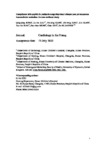Compliance with aspirin in pediatric congenital heart disease post percutaneous transcatheter occlusion: A cross-sectional study
| dc.contributor.author | Song, Q-Q | |
| dc.contributor.author | Zhu, L-H | |
| dc.contributor.author | Chen, O-Y | |
| dc.contributor.author | Xiao, Z-R | |
| dc.contributor.author | Chen, Z | |
| dc.contributor.author | Xiao, Y-B | |
| dc.contributor.author | Meng, J-C | |
| dc.contributor.author | Zuo, C | |
| dc.contributor.author | Latour, Jos M | |
| dc.date.accessioned | 2020-07-16T07:58:30Z | |
| dc.date.issued | 2020-09-03 | |
| dc.identifier.issn | 1047-9511 | |
| dc.identifier.issn | 1467-1107 | |
| dc.identifier.other | PII S1047951120002322 | |
| dc.identifier.uri | http://hdl.handle.net/10026.1/16044 | |
| dc.description.abstract |
<jats:title>Abstract</jats:title><jats:sec id="S1047951120002322_as1"><jats:title>Background:</jats:title><jats:p>Predictors of compliance with aspirin in children following cardiac catheterisation have not been identified. The aim of this study is to identify the caregivers’ knowledge, compliance with aspirin medication, and predictors of compliance with aspirin in children with Congenital Heart Disease (CHD) post-percutaneous transcatheter occlusion.</jats:p></jats:sec><jats:sec id="S1047951120002322_as2"><jats:title>Methods:</jats:title><jats:p>A cross-sectional explorative design was adopted using a self-administered questionnaire and conducted between May 2017 and May 2018. Recruited were 220 caregivers of children with CHD post-percutaneous transcatheter occlusion. Questionnaires included child and caregivers’ characteristics, a self-designed and tested knowledge about aspirin scale (scoring scale 0–2), and the 8-item Morisky Medication Adherence Scale (scoring scale 0–8). Data were analysed using multivariate binary logistic regression analysis to identify predictors of compliance with aspirin.</jats:p></jats:sec><jats:sec id="S1047951120002322_as3"><jats:title>Results:</jats:title><jats:p>Of the 220 eligible children and caregivers, 210 (95.5%) responded and 209 surveys were included in the analysis. The mean score of knowledge was 7.25 (standard deviation 2.27). The mean score of compliance was 5.65 (standard deviation 1.36). Child’s age, length of aspirin use, health insurance policies, relationship to child, monthly income, and knowledge about aspirin of caregivers were independent predictors of compliance with aspirin (p < 0.05).</jats:p></jats:sec><jats:sec id="S1047951120002322_as4"><jats:title>Conclusion:</jats:title><jats:p>Caregivers of children with CHD had an adequate level of knowledge about aspirin. Compliance to aspirin medication reported by caregivers was low. Predictors of medium to high compliance with aspirin were related to the child’s age and socio-economic reasons. Further studies are needed to identify effective strategies to improve knowledge, compliance with medication, and long-term outcomes of children with CHD.</jats:p></jats:sec> | |
| dc.format.extent | 1462-1468 | |
| dc.format.medium | Print-Electronic | |
| dc.language | en | |
| dc.language.iso | en | |
| dc.publisher | Cambridge University Press (CUP) | |
| dc.subject | CHD | |
| dc.subject | medication | |
| dc.subject | adherence | |
| dc.subject | catheterisation | |
| dc.subject | aspirin | |
| dc.subject | children | |
| dc.title | Compliance with aspirin in pediatric congenital heart disease post percutaneous transcatheter occlusion: A cross-sectional study | |
| dc.type | journal-article | |
| dc.type | Journal Article | |
| plymouth.author-url | https://www.webofscience.com/api/gateway?GWVersion=2&SrcApp=PARTNER_APP&SrcAuth=LinksAMR&KeyUT=WOS:000612802200014&DestLinkType=FullRecord&DestApp=ALL_WOS&UsrCustomerID=11bb513d99f797142bcfeffcc58ea008 | |
| plymouth.issue | 10 | |
| plymouth.volume | 30 | |
| plymouth.publication-status | Published | |
| plymouth.journal | Cardiology in the Young | |
| dc.identifier.doi | 10.1017/S1047951120002322 | |
| plymouth.organisational-group | /Plymouth | |
| plymouth.organisational-group | /Plymouth/Faculty of Health | |
| plymouth.organisational-group | /Plymouth/Faculty of Health/School of Nursing and Midwifery | |
| plymouth.organisational-group | /Plymouth/REF 2021 Researchers by UoA | |
| plymouth.organisational-group | /Plymouth/REF 2021 Researchers by UoA/UoA03 Allied Health Professions, Dentistry, Nursing and Pharmacy | |
| plymouth.organisational-group | /Plymouth/Research Groups | |
| plymouth.organisational-group | /Plymouth/Research Groups/Institute of Health and Community | |
| plymouth.organisational-group | /Plymouth/Research Groups/Plymouth Institute of Health and Care Research (PIHR) | |
| plymouth.organisational-group | /Plymouth/Users by role | |
| plymouth.organisational-group | /Plymouth/Users by role/Academics | |
| dc.publisher.place | England | |
| dcterms.dateAccepted | 2020-07-13 | |
| dc.rights.embargodate | 2021-3-3 | |
| dc.identifier.eissn | 1467-1107 | |
| dc.rights.embargoperiod | Not known | |
| rioxxterms.versionofrecord | 10.1017/S1047951120002322 | |
| rioxxterms.licenseref.uri | http://www.rioxx.net/licenses/all-rights-reserved | |
| rioxxterms.licenseref.startdate | 2020-09-03 | |
| rioxxterms.type | Journal Article/Review |


